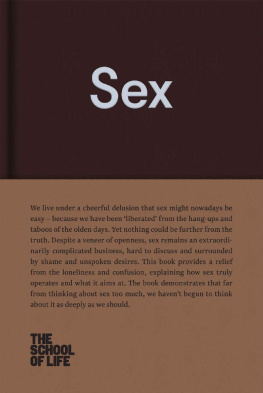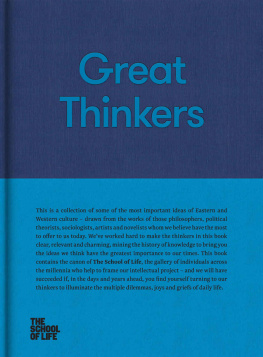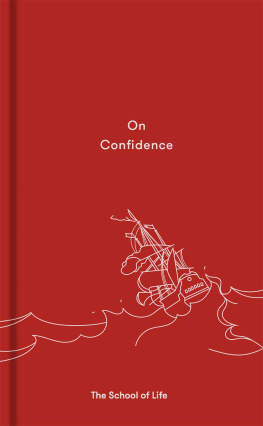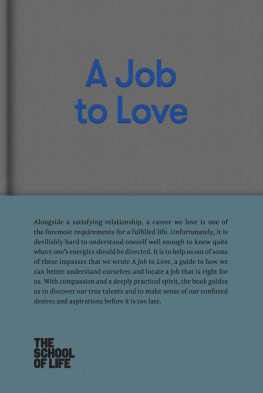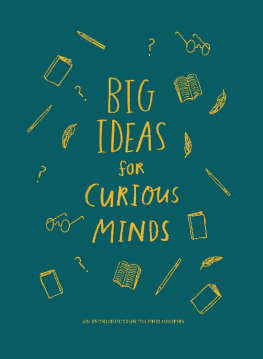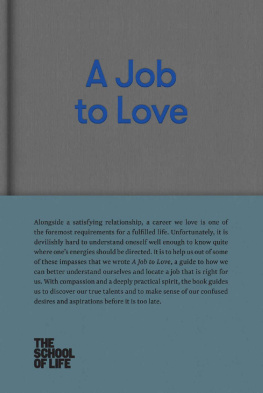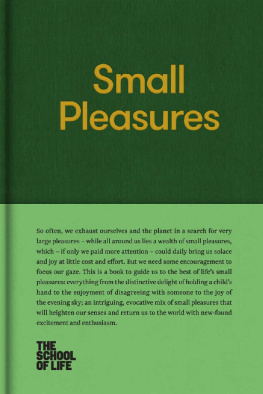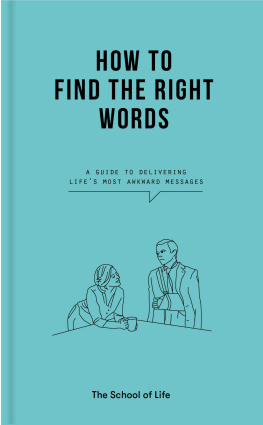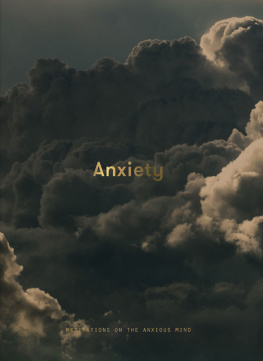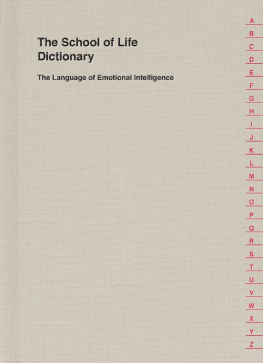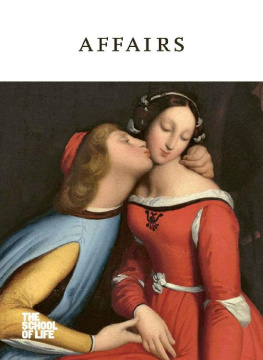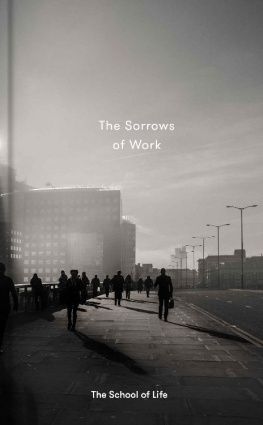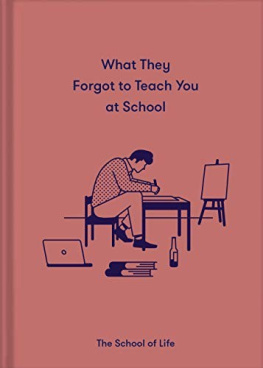The School Of Life - Sex
Here you can read online The School Of Life - Sex full text of the book (entire story) in english for free. Download pdf and epub, get meaning, cover and reviews about this ebook. year: 2017, publisher: The School of Life Press, genre: Home and family. Description of the work, (preface) as well as reviews are available. Best literature library LitArk.com created for fans of good reading and offers a wide selection of genres:
Romance novel
Science fiction
Adventure
Detective
Science
History
Home and family
Prose
Art
Politics
Computer
Non-fiction
Religion
Business
Children
Humor
Choose a favorite category and find really read worthwhile books. Enjoy immersion in the world of imagination, feel the emotions of the characters or learn something new for yourself, make an fascinating discovery.
- Book:Sex
- Author:
- Publisher:The School of Life Press
- Genre:
- Year:2017
- Rating:3 / 5
- Favourites:Add to favourites
- Your mark:
- 60
- 1
- 2
- 3
- 4
- 5
Sex: summary, description and annotation
We offer to read an annotation, description, summary or preface (depends on what the author of the book "Sex" wrote himself). If you haven't found the necessary information about the book — write in the comments, we will try to find it.
Sex — read online for free the complete book (whole text) full work
Below is the text of the book, divided by pages. System saving the place of the last page read, allows you to conveniently read the book "Sex" online for free, without having to search again every time where you left off. Put a bookmark, and you can go to the page where you finished reading at any time.
Font size:
Interval:
Bookmark:
Sex
We live under a cheerful delusion that sex might nowadays be easy because we have been liberated from the hang-ups and taboos of the olden days. Yet nothing could be further from the truth. Despite a veneer of openness, sex remains an extraordinarily complicated business, hard to discuss and surrounded by shame and unspoken desires. This book provides a relief from the loneliness and confusion, explaining how sex truly operates and what it aims at. The book demonstrates that far from thinking about sex too much, we havent begun to think about it as deeply as we should.

Introduction
i. Liberation and Non-Liberation
There is a curious and disturbing fact about human nature: we have different sides to our characters, and different needs, some of which seem notably high-minded and others notably low. We can see the division in dramatic instances: a person delivering a lecture on the meaning of life may be seized by an urgent need to burp; we might try hard to eat a sensible diet, then give way to a craving for confectionary late at night.
We have different words to capture these divisions: the animal and the human; reason and passion; the beast and the angel. So different are these sides, it can seem as if each individual were really two warring people trapped within the same skin.
Nowhere does this contrast feel more intense than around sex. The English novelist Kingsley Amis (19221995) commented in old age on having had an active libido: for 50 years it was like being chained to an idiot .
Generally, were deeply invested in the idea of love. We want to be close, tender and sweet with partners, meet their needs and take their interests to heart. But our libido often doesnt agree: it just wants maximum excitement in a variety of immediate, ruthless and disembodied ways. We may try hard to be polite and considerate to others, but our sex drive may be eager to tie a partner up and flog them. Normally we may be very concerned about our own dignity and feel affronted if another person violates our personal space, while around sex we might be keen to have our genitals roughly explored. One minute, were fussily wiping a tiny spot from the kitchen work surface; at another point, we may be content to defile and be defiled.
When we reflect on these divisions in ourselves, the instinctive response is shame. The nice side of our nature the side committed to dignity, respect and status can feel deeply awkward about being tethered to an apparently delinquent persona.
However, the sense that we need to hide, deny and bury key elements of who we are is not very good for us. As psychoanalysis has stressed, when we repress things that are important, they make themselves heard in other ways. The dirty parts of ourselves can show up disguised as greed, harsh opinions, bad temper, the longing to boss other people about, alcoholism or other forms of risky, damaging behaviour. Freuds lasting contribution was to put his finger on the cost of disavowing powerful parts of ourselves.
There have been occasional attempts to reconcile our inner conflicts. The French philosopher Michel de Montaigne (15331592) was keen to point out how even the most elevated and respected people shared a common basic nature and he formulated striking aphorisms to stress the point: Kings and philosophers shit and so do ladies. And: Even on the highest throne in the world we are seated still upon our arses. If we smile at a learned and serious character like Montaigne making these remarks, it stems from relief at encountering a kindly, generous voice acknowledging what we cannot normally face.
Shame around sex has a long history. In much of the world, for long periods, anal sex between men was the cause of such concern that it was declared illegal. In England, Henry VIII signed The Buggery Act in 1533. The original punishment for this was hanging; in 1861, this was reduced merely to imprisonment. It was not until 1967 that homosexual acts (in private) stopped being against the law.
Many societies have sought to dampen sexual desire by encouraging people to don clothes designed to repel erotic curiosity. In the 1830s in the UK, genteel ladies were encouraged to cover as much of the body as possible in voluminous dresses, headscarves and gloves; giving a glimpse of so much as an ankle was considered scandalous. In Islam, the hijab was introduced to prevent men getting overexcited by the sight of a womans neck. The very language we have inherited is full of euphemism that skirts around the explicit description of things we might do with our bodies. Adult films do not refer to the works of the Russian director Andrei Tarkovsky.
Our shame might sit oddly with us because, at another level, weve taken to heart the idea that we live in an era of sexual liberation. It may be true that in recent decades, a degree of progress has been made. Stand-up comics can make jokes about masturbation; womens sexual appetites have been recognised; bathrooms are designed to feel airy and open. Yet the notion that we are liberated causes us problems all of its own, because it brings with it the assumption that hang-ups and awkwardness can no longer legitimately exist.
In truth, real liberation remains a radically unfinished project; unfinished because we continue to struggle to admit some key things about who we are from a sexual perspective. There is still a very strong presumption that all decent relationships must be monogamous. We retain a strong ideal of being respectable. Theres a powerful presumption that (for instance) a married mother of two who works as a procurement manager for a pharmaceutical firm wont regularly visit sex clubs; that a tax specialist wont be wearing fetish clothing under their suit at an important meeting with clients; that a senior politician wont spend a lot of their free time watching pornography if it turned out they did, it might cause a huge scandal. A lot of quite normal aspects of human sexuality remain located outside our well-intentioned but punitive and normative rules.
The current taboos around sex have their roots in an unfortunate movement of ideas, which can be broadly termed Romanticism, that originated in Europe in the late 18th century. A central aspect of Romanticism is the notion that sex must be interpreted as the ultimate expression of love. According to Romanticism, to love is to feel infinitely sweet towards ones beloved, to be gentle and delicate around them and to renounce interest in all others. The Romantics turned sex into the crowning moment of love, and deemed unacceptable any kind of sexual activity that couldnt be tethered to a sincere expression of affection.
This is a touching idea, but it has ushered in appalling problems: sex and Romantic love can only ever overlap in part and from time to time, while the precarious, fragile ideal of their perfect conjunction has come to be regarded, emotionally speaking, as a necessity.
Sexual self-acceptance does not have to mean abandoning all control or the deliberate flaunting of our less elevated needs at every turn. We dont have to fully embrace every impulse; we just need to be able to admit, in an unfrightened way, that they exist. Just because as Montaigne knew we shit, it doesnt mean we dont have bathroom doors. Theres still a central place for restraint and politeness. However, the core point of true liberation is to reduce the unfair and debilitating burden of shame with which we continue to wrestle.
ii. What This Book Is For
Shame means that many couples still find it difficult to be honest with one another about who they are and what they need to feel satisfied. This cuts them off from sources of affection and honesty. Sexual loneliness remains a norm.
Next pageFont size:
Interval:
Bookmark:
Similar books «Sex»
Look at similar books to Sex. We have selected literature similar in name and meaning in the hope of providing readers with more options to find new, interesting, not yet read works.
Discussion, reviews of the book Sex and just readers' own opinions. Leave your comments, write what you think about the work, its meaning or the main characters. Specify what exactly you liked and what you didn't like, and why you think so.

